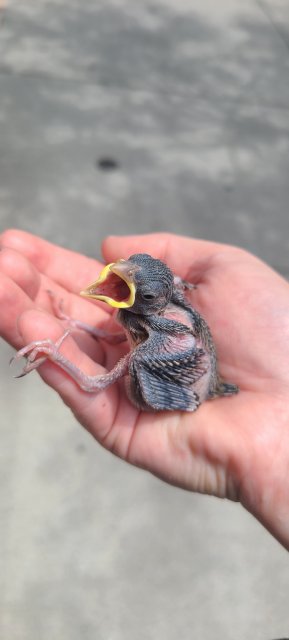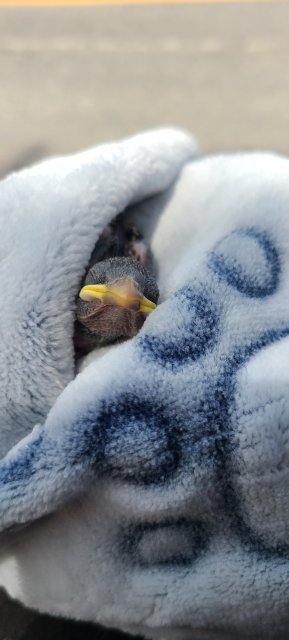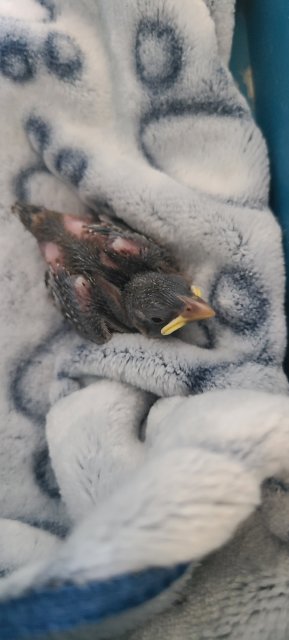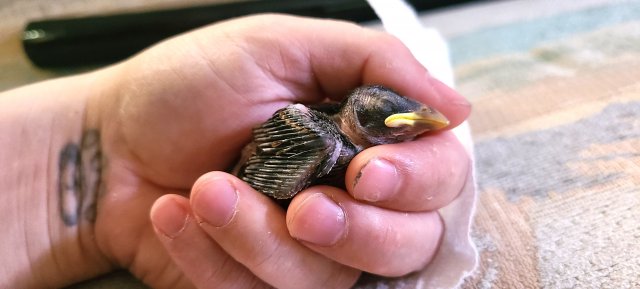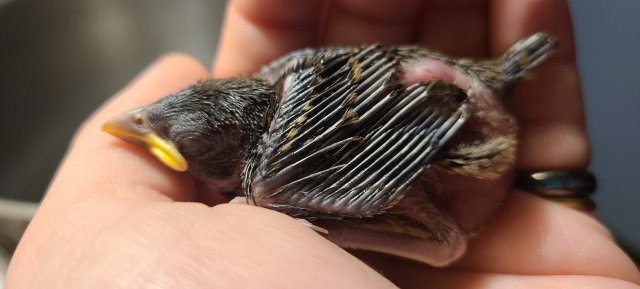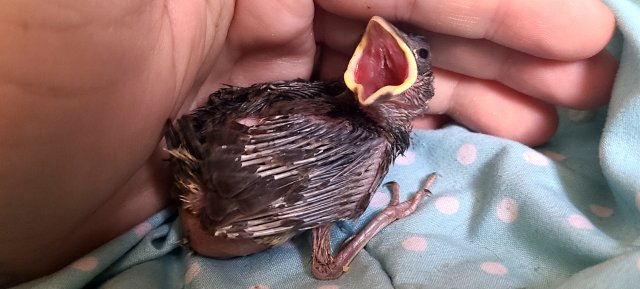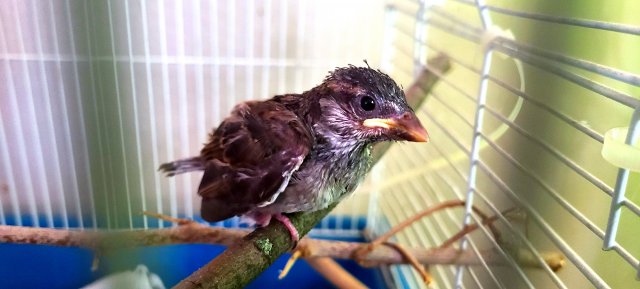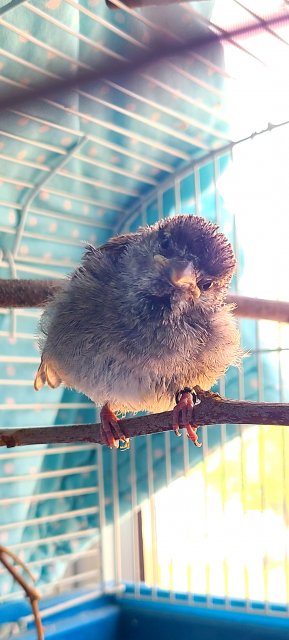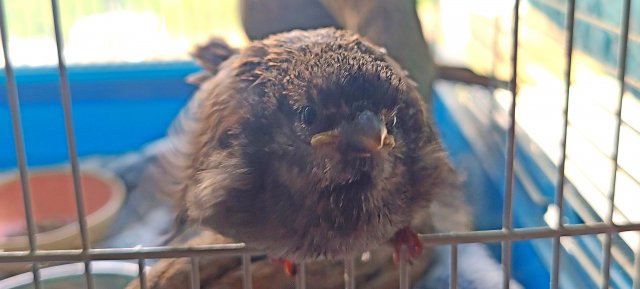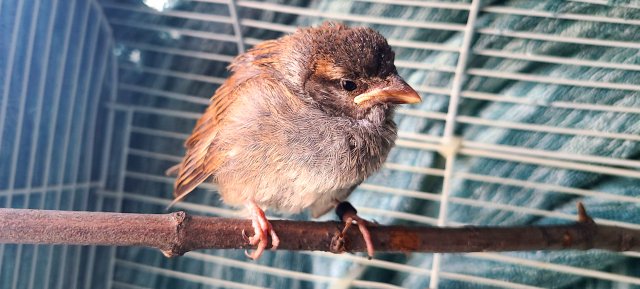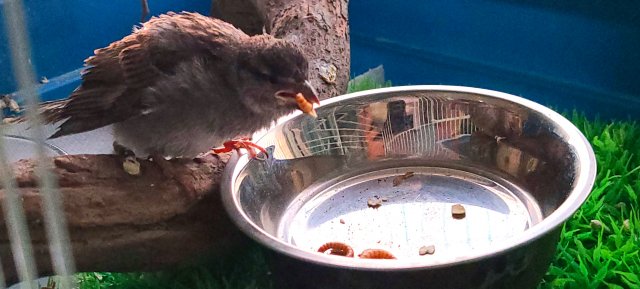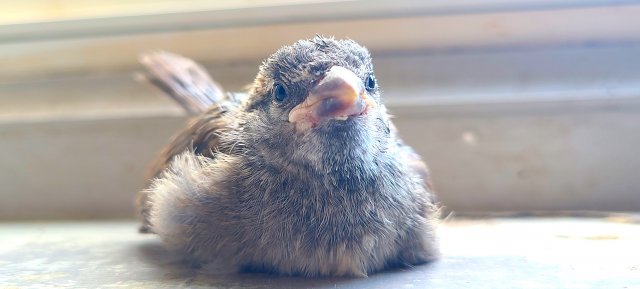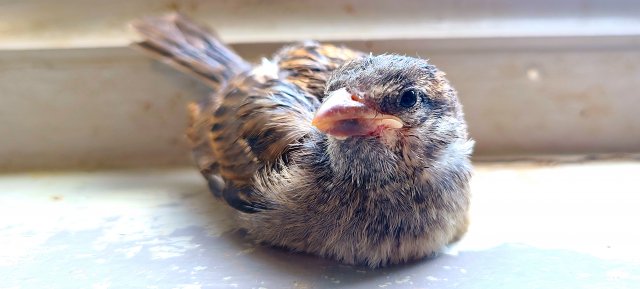Interesting watching the growth process, what did you put on its left leg? I do like the quizzical look on its face in the 2nd to last pic.

I'm all for raising/fostering wildlife when possible but not house sparrows or starlings due to displacing native cavity nesting birds. I know it sounds harsh, I'm just always emptying my blue bird houses of invasive birds.
I totally get this. As a birder, I know a lot of the hate on the invasives, understandably so.
That said, I live in a super urban area, where cavity nesters aren't given a chance here naturally because there's no habitat to support them, and natural cavities are removed as dead trees are deemed unsafe in the city.
Very little else can thrive here, so it doesn't hurt so bad to let it out within the city.
Now, I would not release it in our natural areas, not that the house sparrow spends much time in those compared to cities. Those areas, that's just wrong and irresponsible. That said, our natural areas are farther out from where I live in the city core. Not much is missing out from having one more sparrow here.
A life is a life, even invasives and its a tough balance. On one hand, they shouldnt be here and its our fault theyre here. On the other hand, its generations removed from the originals brought here and has no idea its doing harm, its just trying to live just as much any other creature.
Constant mental battle with it, but I don't have the heart to ignore a life in need, regardless.
If I lived out in the county, I'd have a big outdoor aviary to keep all of the wild sparrows and starlings id wind up raising lol
His leg is a closed plastic band, so when he's released he's recognized. Closed bands don't catch on things like clamp bands, but can only be put on them at a certain age. Can't slip over the foot and can't slip above the ankle joint (where the leg bends at the body).
Im hoping he will integrate into the sparrow flock in our neighborhood, where maybe i could see him from time to time.
NoodleCats, you might work him up to seeds as his beak gets harder, he's almost there I think. You can mix some in with his soft & bug foods. Soaking seeds will help a bit...he needs to learn.
I worked at a wild bird rehab center for 13 years mostly as a volunteer supervisor. Your pics brought back memories both good & well, not so much. It was an interesting experience in an overwhelming, rewarding, dirty, depressing way. We took in 1000-1500+ birds/year mostly nestlings & fledglings in spring & summer. I became allergic to the feather quill dust from all the babies. I was part of the "release committee" to decide when bird were ready to go & band them (paperwork!!). I tried to let new volunteers get to release some as a reward for all their hard work. Sometimes there were happy tears. We also sent some home with volunteers to release at their homes & feed for while.
We also had the "industrial" versions of your soft release, lol. Some of the aviaries had fold down panels so a group of 20(ish) could go &/or come back for a while. Not too long, we always needed the space for more! But we had feeding stations too. 1 of the cooler things was when we had some orioles in a small aviary & wild adults came & were feeding them through the mesh! After a couple days of that we opened the hatch & away they went!
There were sad times too. Wild birds, unlike pets, have to be able to survive in the wild. It's 1 thing for a 1 legged sparrow to survive but they all had to be able to fly at least a little...& perfectly if they were long distance migratory species. There are only a few suitable homes like zoos or wildlife museums for damaged critters & only the raptors, waterbirds or rarer birds usually, not for private parties no matter how well meaning.
I used to be tough enough to euthanize weekly as needed but it was sometimes rough after working for a long time to save it & hoping for the best outcome...I'm a reality based pragmatist but was not always easy to be a part of the "death squad" (we were not allowed to call ourselves that but that's what we were

).
I learned how to give IV & subcutaneous injections, to dilute drugs & have a good guess on diseaes (kinda like we do with fish sometimes, eh?). Also what birds needed to go into a flock & where to find it. I learned what "normal" birds look & behave like & what "people imprinted" birds do (not good!). How to catch an owl in a temple or in a patch of poisin ivy...interesting times indeed. I also started birdwatching to understand better, a more fun part with lots of road snacks!
To Dee (dudley), I understand your aversion to nonnative birds, especially the cavity nesters. Like NC's rehab center, we didn't prioritize them but we did take them. They tended to be second class in our busy season especially but could often survive lesser care, they were not included on our annual talley . We eventually learned to send them home with soft hearted but experienced people. We never let them go at the hospital (in a large county wooded park). Pigeons were especially icky to me, they often came with internal diseases & external parasites but not cavity nesters...just "plague carriers" needing lots of treatments for lots of things...but they were good survivors too...Ugh.
I can always tell if I'm really stressed out for some reason, I dream of gaping mouths & a ton of bird poo...it's been more than 20 years ago since I did all this
Seeds are next once he's eating more on his own. Most of the wild ones here tend to ignore seed in the summer in favor of fresh greens and insects. Usually seeds are turned to in winter. But once he's not eating anymore from tweezers, grass seed heads will be added to forage from and a tray of seeds.
His cage stays covered on all the human viewing sides so he only sees us when he needs feeding. Otherwise, his cage faces a window and is covered on all other sides.
And now he's fledgling, he doesn't need to be cleaned up if he sits in a poop, he is more mobile so no handling either. As cute as he is, it's no good to make him used to people.
I know the heartbreak too, the early days are especially difficult as theyre more delicate. Usually if they make the first two nights, they usually continue making good progress. Those tend to be the biggest hurdles. And then of course there's often internal injuries when falling from nests, this one has a hematoma on the belly but is shrinking and he's been pooping well. It'll go away in time. But, many times those injuries can be fatal.
Couple years back had another house sparrow, one we named Poppy. Had a pretty bad wing sprain from the fall. Bruising and held the wing a little limp. But with a soft tape holding it secure so she didn't move it around or bump it for a couple days, it healed very well and she was a successful release once she learned to forage and fly. She was a little easier to keep wary of humans though, she had a couple "big brothers" in some starling babies she was raised and released with. She was a cutie too, very strong will to live.
Heartbreaks... would have to say the starling I've found hit by a car. Poor thing was paralyzed from the neck down and had to be euthanized. It sucks seeing them suffer like that.
Another was when I was a kid, I found a starling adult attacked by a cat. It's eyes had been clawed and it was totally blinded. I felt so bad for it, I brought it to the school secretary to call for help for it but she told me to just put it back because there were 5000 starlings outside anyways. I had no choice but to listen, found it again after school but it had wandered out into the road and met its end. Probably a kinder thing it died faster by vehicle than slowly succombing to infection or starvation, but still it has haunted me my whole life.
What kills me, the local rehab accepts pigeons. But theyre not native ?
I'm a birder too, I love birds, though I do share the allergy thing too. I'm allergic to my own pet birds, the cockatiels. Make me sneezy and stuffy and itchy eyes. Another reason I won't be keeping this sparrow. After my cockatiels go, I don't plan to keep birds again. I love them, but it is pretty uncomfortable to live with the allergies. Won't rehome them for allergies, so I'll love them until the end of their days, but I won't put myself in that position again in the future.
